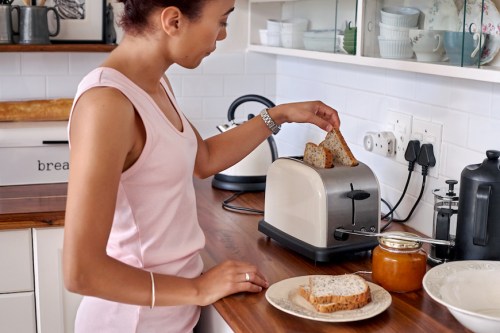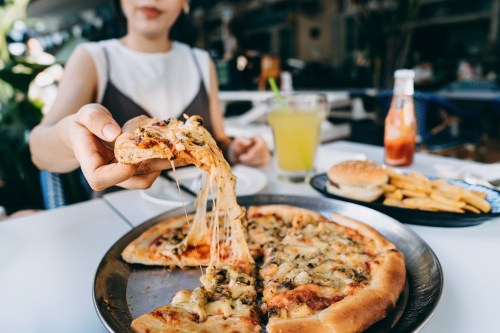Food has perhaps always been used as a way to help people feel better. In many cultures, preparing a meal for someone is the preferred method for showing love; whole emotional exchanges made without saying an actual word. It’s only relatively recently that the science has caught up, showing explicit links between specific foods (and the nutrients they contain) and their potential to help manage depression symptoms.
But not everyone is lucky enough to be surrounded with loved ones who can cook happiness-boosting foods for them in times of need—especially right now. And sometimes, depression can be so heavy that it’s difficult to get out of bed, let alone put together any kind of meal.
The need for healthy meals that are easy enough to make during the worst of a depressive spell inspired an entire conversation about “depression meals” on Reddit. According to integrative and nutritional psychiatrist Ria Battaglino, MD, there are actually a lot of healthy, easy meals for depression that support overall brain and mental health, too.
“The first organ to receive the nutrients in the food we eat is actually the brain,” Dr. Battaglino says. “If the brain doesn’t get what it needs, it sends out messages, and if those messages are ignored, they can become more intense, in the form of shaking and tremors, stomach aches, headaches, anxiety, panic attacks, weakness, or fatigue.”
The major key to avoid all of this: managing blood sugar levels. Dr. Battaglino says that when blood glucose levels are stable, it prevents energy and mood from spiking and crashing. High-sugar foods, as well as those made primarily of simple carbs with little protein or fiber, can spike blood glucose levels and thereby impact stress and anxiety levels. As for what to eat instead, Dr. Battaglino says there are several core foods that will work in your favor. Here, she highlights them while also gives some easy meal ideas putting them to use.
Easy meals for depression filled with nutrients that support mental health:
1. Frozen or canned fish with leafy greens
Dr. Battaglino says one of the best foods for mental health is fatty fish, like salmon, sardines, and tuna. “This is because they’re rich in omega-3s,” she says, fatty acids that are beneficial for brain and heart health and have potential to help with depression and other mental health conditions. (More conclusive research is needed, though.)
Cooking fish might seem fussy and complicated, but because these fish can be bought fresh, frozen, or canned, they don’t require as much work as you’d think. Frozen or fresh fish can be quickly baked in the oven at 400°F for 10 minutes with some olive oil, salt, and pepper. Or if even 10 minutes sounds too long, canned fish comes ready-to-eat.
Dr. Battaglino suggests pairing your fish with leafy greens, which are a good source of magnesium, another nutrient linked to combatting depression. “Magnesium is so important for neurological function in terms of treating anxiety or depression, and it’s a nutrient most people in the U.S. are deficient in,” she says.
2. Peanut butter on whole wheat toast
Nuts and seeds are also good sources of magnesium, and they don’t require any cooking whatsoever, which is another reason why Dr. Battaglino is such a fan of them. Adding a handful to your oatmeal can help boost your mood (and provide healthy fats and protein to help keep blood sugars stable). You can also reap the mental health benefits of nuts by enjoying them in nut butter form, such as peanut butter on whole wheat toast. There’s nothing easier than that!
3. Alt-pasta and frozen spinach
Feeling sad or depressed is often coupled with craving hearty pasta; there’s a reason why mac-and-cheese is the quintessential comfort food. “You can still have mac-and-cheese, just choose a protein-rich pasta that gives nutrients and won’t spike your blood sugar,” Dr. Battaglino says, highlighting edamame, chickpea, and lentil pasta as all good choices to consider. Plus, many alt-pastas cook even faster than traditional flour pasta—an added perk for depression meal crafting.
While you’re heating up your pasta on the stove, Dr. Battaglino suggests adding frozen spinach to the pot for some extra magnesium (yep, that nutrient again) in your meal. “Frozen spinach is one food I recommend because it’s cheap, easy to find, and quick to make—you can just steam it on the stove or throw it in the microwave,” Dr. Battaglino says. This combo (or trio with cheese), still has all the making of a classic comfort food dish, but it also delivers on the brain health front, too.
4. White bean soup with sauerkraut
Dr. Battaglino says fermented foods have also been scientifically linked to improving mood, thanks to all their probiotic-goodness. “Some cultures, like Asian cultures, naturally work fermented foods into the majority of their meals, but they aren’t often included in American ones,” she says. Sauerkraut is one fermented food in particular that Dr. Battaglino says is full of probiotics, although she emphasizes the importance of buying it refrigerated, as many shelf-stable sauerkrauts are pasteurized which largely loses the probiotic benefits.
Pair your ‘kraut with pre-made chicken or vegetable broth and canned white beans for a quick way to turn it into a nourishing comfort food. Not only is this a high-protein and high-fiber meal ready in minutes, beans also contain magnesium—and you know by now how Dr. Battaglino feels about magnesium.
5. Miso soup
“Miso soup is another fermented food and good source of probiotics,” Dr. Battaglino says. If truly all you have the energy for is heating something up the microwave or stove, this meal can be it. Miso is also high in protein, so it delivers on the energy-giving front, too.
All the depression meal ideas on this list help to boost mood and also work to keep blood sugar levels steady. And Dr. Battaglino emphasizes another underlying way they help too: the mere act of getting out of bed and putting in the effort (even if it’s minimal) is important. “It’s important to eat and have regular mealtimes because having a routine is good for our mental health,” she says. “Right now during quarantine, many people are not following a regular routine and are falling into depression, anxiety, or state of listlessness. It’s still good to be flexible, but having some degree of routine can be helpful.”
Sign Up for Our Daily Newsletter
Get all the latest in wellness, trends, food, fitness, beauty, and more delivered right to your inbox.
Got it, you've been added to our email list.









